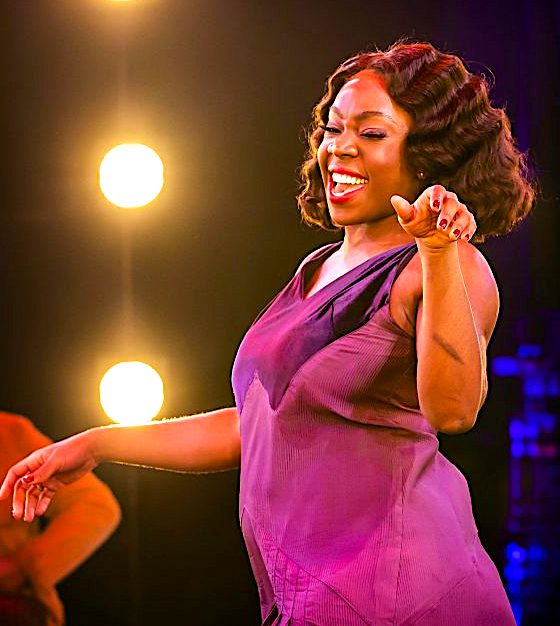The Color Purple - at Home, Curve online review – life-affirming musical retelling of Alice Walker's novel | reviews, news & interviews
The Color Purple - at Home, Curve online review – life-affirming musical retelling of Alice Walker's novel
The Color Purple - at Home, Curve online review – life-affirming musical retelling of Alice Walker's novel
Celie learns how to live from the strong, rebellious women she encounters

This production of The Color Purple is an extraordinary testimony to the fact that many of the 20th century’s most joyous forms of music – jazz, ragtime and of course blues – had their roots in misery and oppression.
Last month it was announced that a film version of the musical will be released in cinemas – microbes permitting – in December 2023. In the meanwhile the Leicester Curve production, in conjunction with the Birmingham Hippodrome, provides an invigorating reminder of the appeal of Marsha Norman, Brenda Russell, Allee Willis and Stephen Bray’s Tony-award winning barnstormer, which got a second lease on life both sides of the Atlantic from John Doyle's pared-back revival, first seen at London's Menier Chocolate Factory in 2013.
That the show exudes such ecstatic energy comes despite the fact that Leicester Curve theatre has had to fight accusations of religious discrimination after the actor Seyi Omooba – who was initially hired to play the lesbian central character, Celie, when this show was first preparing to be seen live – was dismissed from the production for a homophobic tweet. After a lengthy legal battle, in which she was supported by the Christian Legal Centre, the Curve last week announced that her claims had been rejected by an employment tribunal.
The simple staging of Tinuke Craig’s production, which has no backdrop but is set on a stage with revolving concentric circles, combines with Jordan Dean’s camerawork to create something that feels simultaneously theatrical and filmically natural: quite some achievement, as anyone watching the evolution of theatre over this challenging year will know. After a rousing gospel-style opening at the church, the camera zooms in from above on T’Shan Williams’s Celie to reveal her character holding the second baby she has had as a result of rape by her father.
The joy dominating this production is due in no small measure to the fact that Celie drags herself out of her terrible situation as a result of the strong, rebellious women that she encounters. Williams (below) is an extraordinary stage presence – simultaneously humble and charismatic; when she’s downtrodden she can seem as dejected as a dishcloth, yet when she meets someone with whom she resonates, the hum of transcendent happiness is almost audible.
 Growing up in rural Georgia at the start of the twentieth century, the first strong woman in her life is her bookish sister Nettie. Danielle Fiamanya is a compelling presence in that role – her character’s affection for Celie is balanced with outrage at how her sister has been treated. In that relationship we see the predicament of Celie’s existence. When the brutish Mister (a difficult role tackled with aplomb by Ako Mitchell) turns up and says he wants to marry Nettie, Celie paradoxically makes her life simultaneously better – through saving her sister – and far, far worse by saying she will marry him instead.
Growing up in rural Georgia at the start of the twentieth century, the first strong woman in her life is her bookish sister Nettie. Danielle Fiamanya is a compelling presence in that role – her character’s affection for Celie is balanced with outrage at how her sister has been treated. In that relationship we see the predicament of Celie’s existence. When the brutish Mister (a difficult role tackled with aplomb by Ako Mitchell) turns up and says he wants to marry Nettie, Celie paradoxically makes her life simultaneously better – through saving her sister – and far, far worse by saying she will marry him instead.
The narrative arc shows Celie's discovery that she does not have to sacrifice herself to make life better. The turning point comes when her stepson Harpo brings home the defiantly assertive Sofia, played with exuberant chutzpah by Karen Mavundukure. In the wonderful song "Hell No! (All my life I had to fight") she shows Celie – who, along with Mister has suggested to Harpo that he beat Sofia so as to control her – that self-abasement ultimately represents betrayal not just of herself but of those around her.
As Shug Avery – who collapses drunk on the stage shortly after arriving there – Carly Mercedes Dyer (pictured above) fearlessly embodies both the flaws and strengths of the woman who becomes the love of Celie’s life. The chemistry between them is credible not least because of the directness with which Williams’s Celie expresses it. Shug’s first number is the raunchily sultry "Push da button", but Celie’s "What About Love" escapes seduction clichés to ask fundamental questions about who they both really are.
Full credit must go to both musical director Alex Parker and choreographer Mark Smith for investing the songs and movement with a vibrant energy that breaks through the screen. The production is inspired by a brilliant novel, but the music is no mere addition; it is intrinsic to what makes the production resonate. The subject matter is tough, yet ultimately this is a life-affirming, unsentimental retelling of Walker’s powerful story. A tonic, then, in difficult times – not least for being one of the more successful productions in navigating the tricky terrain between theatre and film, leaving the audience members wanting to sing and dance themselves, no mean feat at this stage of lockdown.
@Hallibee1
The future of Arts Journalism
You can stop theartsdesk.com closing!
We urgently need financing to survive. Our fundraising drive has thus far raised £49,000 but we need to reach £100,000 or we will be forced to close. Please contribute here: https://gofund.me/c3f6033d
And if you can forward this information to anyone who might assist, we’d be grateful.

Subscribe to theartsdesk.com
Thank you for continuing to read our work on theartsdesk.com. For unlimited access to every article in its entirety, including our archive of more than 15,000 pieces, we're asking for £5 per month or £40 per year. We feel it's a very good deal, and hope you do too.
To take a subscription now simply click here.
And if you're looking for that extra gift for a friend or family member, why not treat them to a theartsdesk.com gift subscription?
more Theatre
 Edinburgh Fringe 2025 reviews: The Beautiful Future is Coming / She's Behind You
A deft, epoch-straddling climate six-hander and a celebration (and take-down) of the pantomime dame at the Traverse Theatre
Edinburgh Fringe 2025 reviews: The Beautiful Future is Coming / She's Behind You
A deft, epoch-straddling climate six-hander and a celebration (and take-down) of the pantomime dame at the Traverse Theatre
 Good Night, Oscar, Barbican review - sad story of a Hollywood great's meltdown, with a dazzling turn by Sean Hayes
Oscar Levant is an ideal subject to refresh the debate about media freedom
Good Night, Oscar, Barbican review - sad story of a Hollywood great's meltdown, with a dazzling turn by Sean Hayes
Oscar Levant is an ideal subject to refresh the debate about media freedom
 Edinburgh Fringe 2025 reviews - Monstering the Rocketman by Henry Naylor / Alex Berr
Tabloid excess in the 1980s; gallows humour in reflections on life and death
Edinburgh Fringe 2025 reviews - Monstering the Rocketman by Henry Naylor / Alex Berr
Tabloid excess in the 1980s; gallows humour in reflections on life and death
 Edinburgh Fringe 2025 reviews: Lost Lear / Consumed
Twists in the tail bring revelations in two fine shows at the Traverse Theatre
Edinburgh Fringe 2025 reviews: Lost Lear / Consumed
Twists in the tail bring revelations in two fine shows at the Traverse Theatre
 Make It Happen, Edinburgh International Festival 2025 review - tutting at naughtiness
James Graham's dazzling comedy-drama on the rise and fall of RBS fails to snarl
Make It Happen, Edinburgh International Festival 2025 review - tutting at naughtiness
James Graham's dazzling comedy-drama on the rise and fall of RBS fails to snarl
 Edinburgh Fringe 2025 reviews: I'm Ready To Talk Now / RIFT
An intimate one-to-one encounter and an examination of brotherly love at the Traverse Theatre
Edinburgh Fringe 2025 reviews: I'm Ready To Talk Now / RIFT
An intimate one-to-one encounter and an examination of brotherly love at the Traverse Theatre
 Top Hat, Chichester Festival Theatre review - top spectacle but book tails off
Glitz and glamour in revived dance show based on Fred and Ginger's movie
Top Hat, Chichester Festival Theatre review - top spectacle but book tails off
Glitz and glamour in revived dance show based on Fred and Ginger's movie
 Edinburgh Fringe 2025 reviews: Alright Sunshine / K Mak at the Planetarium / PAINKILLERS
Three early Fringe theatre shows offer blissed-out beats, identity questions and powerful drama
Edinburgh Fringe 2025 reviews: Alright Sunshine / K Mak at the Planetarium / PAINKILLERS
Three early Fringe theatre shows offer blissed-out beats, identity questions and powerful drama
 The Daughter of Time, Charing Cross Theatre review - unfocused version of novel that cleared Richard III
The writer did impressive research but shouldn't have fleshed out Josephine Tey’s story
The Daughter of Time, Charing Cross Theatre review - unfocused version of novel that cleared Richard III
The writer did impressive research but shouldn't have fleshed out Josephine Tey’s story
 Evita, London Palladium review - even more thrilling the second time round
Andrew Lloyd Webber's best musical gets a brave, biting makeover for the modern age
Evita, London Palladium review - even more thrilling the second time round
Andrew Lloyd Webber's best musical gets a brave, biting makeover for the modern age
 Maiden Voyage, Southwark Playhouse review - new musical runs aground
Pleasant tunes well sung and a good story, but not a good show
Maiden Voyage, Southwark Playhouse review - new musical runs aground
Pleasant tunes well sung and a good story, but not a good show
 The Winter's Tale, RSC, Stratford review - problem play proves problematic
Strong women have the last laugh, but the play's bizarre structure overwhelms everything
The Winter's Tale, RSC, Stratford review - problem play proves problematic
Strong women have the last laugh, but the play's bizarre structure overwhelms everything

Add comment